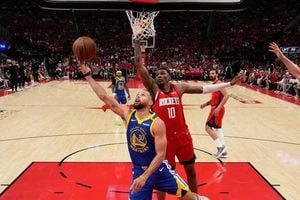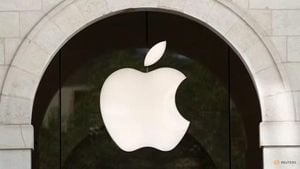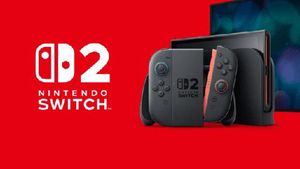Controversy reigns as 'Wheel of Fortune' highlights gameplay moments raising eyebrows among fans and contestants alike. Two episodes recently showcased intense competition, showcasing puzzling wins and questionable rules which have sparked fervent discussions across social media.
One of the most talked-about moments occurred during March 15, 2024, when contestant Max McGee snatched victory from fellow player Patricia Blackburn-Hunt. The tension culminated as McGee progressed to the Bonus Round, securing his win with only milliseconds to spare. The final puzzle read: "_, _ _ _ T _ N _, _ _, T_ _, _ _ N _ _". Blackburn-Hunt initially guessed, "A MEETING OF THE MIND!", but missed by one letter. McGee capitalized on her error to provide the correct answer of "A MEETING OF THE MINDS!" after Sajak prompted him, "You picked it up, and you end up as the big winner." This victory earned him $32,910, and with the stakes raised, he faced the Bonus Round.
McGee selected the category "Phrase" and correctly guessed the five letters, but faced difficulty with the final puzzle, facing the clock's relentless tick. After two incorrect guesses, he made one final attempt as the buzzer went off, stating, "We Are Moving Forward". To the surprise of many viewers, the judges deemed it valid. "You ran back and you picked it up!" Sajak exclaimed as he announced McGee's total winnings reached $77,645, already generating mixed reactions on social media.
One viewer commented, "Wow! You broke the buzzer!", exclaiming excitement over the narrow victory. Yet, another warned, "Max definitely STOLE it from Patricia! He couldn’t have done it on his own!" sparking debates around fairness. Online platforms also played host to conflicting opinions over McGee's swift catch, illustrating how close contests can ignite passion among fans.
Similarly controversial, the February 3 episode introduced its own drama as contestant Krystal Adams faced scrutiny. Dominantly leading the game for most of the episode, Adams grabbed early wins and headed confidently to the Bonus Round. She snagged additional letters but left with the puzzle reading: "_ _ _ _ / _ _ I T _ R I S T".
Despite her winning track record, the pressure mounted. Seacrest noted, "I don’t know how you were gonna get there" after the answer revealed was "Jazz Guitarist," describing her loss of $40,000 and the tension surrounding the overlooked puzzle. Many fans found this round particularly harsh, with online commenters labeling it "impossible" and expressing sympathy for Adams.
One user wrote, "Totally impossible, at least for me, with the little help she had," echoing sentiments others shared over the raised stakes of the game. Amidst their lamentations, comments circulated questioning standards on contestant wins, reminding us of past incidents where contestants were nicked due to precise pronunciations.
A particularly marked case arose from Salonga's performance just before Adams. During the same episode, contestant Arzice Salonga made headlines due to her mispronunciation after correctly guessing "African Safari" but pronouncing it incorrectly as "Sa-FAIR-ee". Her win was swiftly claimed by competing contestant Brian Nelson, deemed to have correctly pronounced it, stirring online supporters to rally behind Salonga.
"That was cheap. I didn’t think they were so fussy on pronunciation," expressed one Reddit user, lamenting the narrow margin separating players from victory. "She was robbed IMO," echoed another, igniting discussions on how pronunciation should be considered across different accents. The divisions among commentators highlight how regions unearth distinct dialects which could affect gameplay.
Reactions to Salonga’s ruling invoked arguments about fairness and gameplay protocol. Some argued, "I’m gonna go against the grain. Wheel is a show about words. You should pronounce the words correctly to win." Others weighed the pros and cons of accent influences over strict enforcements of rules. The situation stirs memories of past incidents where contestants lost wins over similar pronunciation dilemmas.
The repercussions of these recent episodes stretch beyond the small screen. They provoke wider questions around upholdings of fair play—should the game tighten its grips over contestants' pronunciations, or maintain flexibility, accommodating the variations found nationwide? The listeners and players reflect on the need for consistency, transparency, yet room for regional nuance when allowing contestants' victories to stand (or fall) based on precise gameplay moments.
Perhaps, as the audience continues to passionately observe, potential resolutions may well circle back through the nostalgia fans hold for 'Wheel of Fortune'. This legacy remains not merely with spelling puzzles but the intrinsic human encounters they birth.



